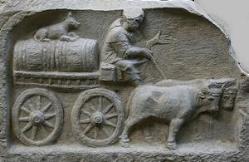- Quelle Dr. M. Bacherler HSB 38: 18 Ortsnamen des Bistums Eichstätt enthalten das Grundwort -bühl. Dörfer sind davon nur 3, nämlich Kd. Nußbühl (Teilg. VI II : 1282 MB 49 117 Nvzbuhel; d. i. Hügel mit Nußbäumen), D. Röckersbühl (III A: 1289 RB 4, 421 Rigerspihl; zu Pn Riger, Rüdeger) und D. Eberhardsbühl (IV A: 1403 RB 11, 285 Eberhartzpuhel; zu,Pn Eberhard), Wüstungen 3, *Schauernbüchl (VIII abgeg. bei Nußbühl, ao. 1342 Pappenheimer Regesten Nr. 748, vgl. ahd. scorro Steilabfall), *Schweinbühl abgeg. Gut bei Ellingen (II: 1294 RB 4, 551 Sweinspäl) und *Sachsenbühl abgeg. bei Oberweiling (IIIB: 1394 s. Hist. Ver. Neumarkt 29/30 S. 105); Einöden bilden 6, nämlich : Hennbühl (IA, zu hegenin von Dornstrauch bewachsen), Thannbügl und Hohenbügl (III B), Eisbühl (V; Pn Is ), Schönbühl und Lindenbühl (VI: c. 1137 Hei 387 Lintinbuhil, d.. i. Lindenhügel); Weiler ebenfalls 6, nämlich Heubühl (V : liege Einhegung, heu Grenzwald), Steinabühl (VIIB. 1157, Dörr, Aus der Siedlungsgesch. von Gunzenhausen 1920 S. 7 Steininbuhel); , Rehenbühl (VI : 1489 Scherlein p. 252 Rehenpuhel, zu mhd. rech rauh, trocken), Gold- , Stein- und Lerchenbühl (VIII: gold = goldfarbiger Sand; 1489 Scherlein p. 240 Lerchenpuhel, zu mhd. larche Lärchenbaum). Über drei Viertel sind demnach Zwergsiedlungen, kein einziges -bühl besitzt eine Pfarrkirche. Die Die Bühl-Orte haben noch geringere Bedeutung erlangt als die -hüll und -au aufweisen, die wenigstens noch einige Spätpfarreien aufweisen.
- w w w .tara.tcd.ie/bitstream/2262/3921/1/jssisiVolXII263_294.pdf
BALLY.-BALLY is the most common Townland prefix, it occurs more than 5,100 times, and usually signifies " a town," from the Irish baile, " a town " or " village," as Ballyclogh, baile clock, " the town of the stone." In some cases, however, the word BALLY is not derived from baile, " a town," but from bel, " a mouth," in combination with ath, " a ford," as Ballinafad, bel-an-atha-jada, " the mouth of the long ford." The word baile is also found in the Gaelic of Scotland, and usually means " a town," " a farm," as Balnakilly, " the town of the wood " (Perthshire). In Manx the word is bailey, and also usually signifies " a farm." as Balladoo, "black farm."
- These: Die bühl-Orte kommen wohl von Quelle: w w w.pbenyon1.plus.com/Misc/Etymology.html
... Etymology Of British Place-names *** Balla (Gaelic), from baile, an abode; engl. abode = Wohnstätte, seinen Wohnsitz aufschlagen.
 Das waren aber wohl keine Römer, sondern Kelten = Vangionen. Wenn aber am Euerwanger Bühl Vangionen waren, könnten auch andernorts die Spuren darauf hin deuten.
Das waren aber wohl keine Römer, sondern Kelten = Vangionen. Wenn aber am Euerwanger Bühl Vangionen waren, könnten auch andernorts die Spuren darauf hin deuten.
